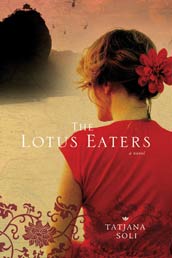Publishing Talks: David Wilk interviews Jim Mairs about The Red Book
July 11, 2010 by David
Filed under Publishing History, PublishingTalks
 In this series of interviews, called Publishing Talks, I have been talking to book industry professionals about the future of publishing, books, and culture. This is a period of disruption and change for all media businesses. How will publishing evolve as our culture is affected by technology, climate change, population density, and the ebb and flow of civilization and its economics? Publishing Talks interviews help us understand the outlines of what is happening, and how we might ourselves interact with and influence the future of publishing as it unfolds.
In this series of interviews, called Publishing Talks, I have been talking to book industry professionals about the future of publishing, books, and culture. This is a period of disruption and change for all media businesses. How will publishing evolve as our culture is affected by technology, climate change, population density, and the ebb and flow of civilization and its economics? Publishing Talks interviews help us understand the outlines of what is happening, and how we might ourselves interact with and influence the future of publishing as it unfolds.
These interviews give people in the book business a chance to talk openly about ideas and concerns that are often only talked about “around the water cooler,” at industry conventions and events, and in emails between friends and they give people inside and outside the book industry a chance to hear first hand some of the most interesting and challenging thoughts, ideas and concepts being discussed by people in the book business.
After nearly 40 years with W.W. Norton, former v-p, senior editor and director of production Jim Mairs left the company in 2002 to found his own company, Quantuck Lane Press, which is distributed by W.W. Norton. He is mainly responsible for the existence of this stunning and important publishing project, The Red Book. This is how it is described in the Norton catalog: “The most influential unpublished work in the history of psychology.”
And this is Jung himself, describing his work on this book from 1914 to 1930:
“The years, of which I have spoken to you, when I pursued the inner images, were the most important time of my life. Everything else is to be derived from this. It began at that time, and the later details hardly matter anymore. My entire life consisted in elaborating what had burst forth from the unconscious and flooded me like an enigmatic stream and threatened to break me. That was the stuff and material for more than only one life. Everything later was merely the outer classification, the scientific elaboration, and the integration into life. But the numinous beginning, which contained everything, was then.”
I’ve had the pleasure of knowing Jim Mairs for many years and wanted to talk to him about the “inside story” of this incredible publishing project, from the physical to the almost spiritual elements of the project. For anyone interested in the way truly special books can still be published in this modern era of publishing, or for anyone interested in The Red Book as an icon of Jungian psychology, I hope this discussion will be valuable and interesting, as it was for me.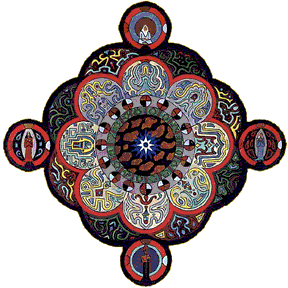
Podcast: Play in new window | Download
Gene Kritsky: The Quest for the Perfect Hive
July 8, 2010 by David
Filed under Non-Fiction, WritersCast
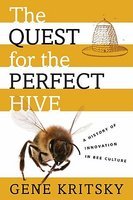 978-0195385441 – Oxford University Press – Hardcover – $24.95
978-0195385441 – Oxford University Press – Hardcover – $24.95
I have never kept bees, but am in love with honey, and the idea of beekeeping has always fascinated me. Gene Kritsky, who describes himself as “stung with the love of bees,” has written a wonderful book that will appeal to serious beekeepers, amateur bee lovers and even general readers with an interest in the history of humanity’s relationship with nature. The book is beautifully illustrated with amazing photographs, drawings and woodcuts representing hundreds of years of beekeping history.
Humans discovered honey thousands of years ago and have been working with these amazing insects for a very long time. What is interesting to the novice reader is how little beekeeping has changed. There have been many innovations in beekeeping, especially so during the past couple hundred years, but traditional beekeeping methods still exist in many parts of the world. And there is much that we can learn from past practices to help us understand how to stave off the epidemic of hive collapse that has become prevalent in so many places during the past few years.
Kritsky uggests that beekeeping’s long history may provide us with clues to help modern beekeepers fight the decline in honey bee numbers. Kritsky takes readers through the history of beekeeping, from early mud-based horizontal hives to the ascent of the simple straw skep (the inverted basket which has been in use for over 1,500 years), from the Golden Age of hive design in Victorian England up to and into the present day. In concise terms, aided by illustrated exampes, he talks about what has worked, what has not worked, and sometimes the things we have forgotten about hives of the past that might help counter the threats to modern bees and beekeeping. While scientists have now sequenced the honey bee genome and advanced our knowledge, we still keep bees in hives that have not changed very much during the past hundred years. Kritsky argues that we must start inventing again if we are going to save our bees. Thus the search for the “perfect hive” continues.
Gene Kritsky is a master of his subject in both depth and breadth, and thus is an easy author to interview. Doubtless he could talk in depth for hours about bees and maintain the listener’s interest. It was a pleasure to talk to him about this interesting and unusual book, and I am confident that listeners will enjoy our conversation as well.
Podcast: Play in new window | Download
Publishing Talks: David Wilk interviews David Steinberger
July 4, 2010 by David
Filed under Publishing History, PublishingTalks, The Future
 In this series of interviews, called Publishing Talks, I have been talking to book industry professionals about the future of publishing, books, and culture. This is a period of disruption and change for all media businesses. How will publishing evolve as our culture is affected by technology, climate change, population density, and the ebb and flow of civilization and its economics? Publishing Talks interviews help us understand the outlines of what is happening, and how we might ourselves interact with and influence the future of publishing as it unfolds.
In this series of interviews, called Publishing Talks, I have been talking to book industry professionals about the future of publishing, books, and culture. This is a period of disruption and change for all media businesses. How will publishing evolve as our culture is affected by technology, climate change, population density, and the ebb and flow of civilization and its economics? Publishing Talks interviews help us understand the outlines of what is happening, and how we might ourselves interact with and influence the future of publishing as it unfolds.
These interviews give people in the book business a chance to talk openly about ideas and concerns that are often only talked about “around the water cooler,” at industry conventions and events, and in emails between friends and they give people inside and outside the book industry a chance to hear first hand some of the most interesting and challenging thoughts, ideas and concepts being discussed by people in the book business.
David Steinberger is well known now as the CEO and President of The Perseus Books Group. Perseus is in many ways, a creation of the unusual business conditions that have marked the book industry over the past dozen years. The company began as a relatively small independent book publisher, growing over time via acquisitions of usually unwanted or under appreciated business units of other companies. Today it is made up of about 10 seperate imprints. Its six main publishing divisions include PublicAffairs (non-fiction), Running Press (fiction and non-fiction titles), Basic Books (non-fiction), Da Capo (non-fiction), Vanguard (fiction and non-fiction), and Avalon Travel (travel guides). Perseus also publishes academic books, including college textbooks from Westview Press.
In addition to publishing, Perseus acquired Client Distribution Services (renamed Perseus Distribution), Consortium (specializing in mostly independent literary and political presses) and most of the assets of Publishers Group West (PGW) in daring and innovative bankruptcy purchase, so that today it is by far the largest distributor of client publishers in the North American market. With Steinberger as CEO and Joe Mangan as COO (and aided by strong financing from its parent company), Perseus has crafted what appears to be a very successful strategy for navigating changeful times, including an early and deep commitment to digital publishing, a diverse set of publishing imprints, a decentralized management system based around a set of core services shared by internal resources as well as clients, and a willingness to experiment with new ideas (including Vanguard’s no-advance, high royalty publishing program as well as a variety of interesting digital initiatives).
In my conversation with David Steinberger, I wanted to learn more about how he sees Perseus today, as well as a sense of his vision for the future, not only of Perseus itself, but the publishing industry as a whole. I think listeners interested in the future of publishing and book distribution will find this discussion useful and interesting on a number of levels.
Podcast: Play in new window | Download
Marc Simont: The Beautiful Planet: Ours to Lose
June 20, 2010 by David
Filed under Art and Photography, Children's Authors, WritersCast
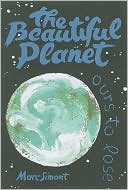 978-1935212-09-6 – Easton Studio Press – Paperback – $15.00
978-1935212-09-6 – Easton Studio Press – Paperback – $15.00
The Beautiful Planet: Ours To Lose is an impassioned anti-war cartoon book by one of America’s foremost illustrators. Marc Simont’s drawings, taken from five decades of editorial cartooning, capture the essence of a brooding Nixon, a smiling Reagan, a bland Bush One, and a dumbfounded Bush Two as they prosecute their wars. Simont’s fierce portrayals of the Military-Industrial Complex are intimately linked to his passionate indignity on behalf of all civilians, soldiers, and prisoners who have suffered.
Continually struck by the majesty of the planet as it floats in space like a jewel, Simont asks, will it survive? Born in Paris in 1915 to Catalonian parents (his father was himself a world renowned illustrator), Marc Simont spent his childhood in France, Spain and finally the United States, where he settled in 1934. After serving time in the U.S. Army during World War II, Simont went on to illustrate over a hundred books working with a wide range of authors, including Margaret Wise Brown, Red Smith, and James Thurber. Simont received the Caldecott Medal in 1957 for his illustrations to A Tree is Nice by Janice May Udry and a Caldecott Honor in 1950 for The Happy Day by Ruth Krauss. He is the author/illustrator of seven books, most recently The Stray Dog (2001), which won yet another Caldecott Honor, was chosen by The New York Times as one of the ten best illustrated books of the year, became an ALA Notable Children’s Book and received the Boston Globe-Horn Book Honor Book Award.
Internationally acclaimed for its grace, humor and beauty, Marc Simont’s art is in collections as far afield as the Kijo Picture Book Museum in Japan. He was chosen as the 1997 Illustrator of the Year in his native Catalonia and received the Hunter College James Aronson Award for Social Justice Journalism in 2008.
Interviewing Marc about this terrific book was a special occasion for me. I love the illustrations he has done for so many exceptional children’s books, many of which I know well, having read them to my own children. I was lucky to have the opportunity to work with him in producing The Beautiful Planet, which collects the pithy, humane and piercing political cartoons he has been making and publishing in The Lakeville Journal since the 1940’s. In this conversation, we talked about his early life, coming to America, his early work as an illustrator, his many well known collaborators, and of course his political cartoons that are collected here in this, his newest book.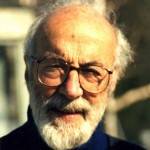 Marc’s approach is never to attack, but always to expose fallibility. He is a wonderful man whose work is marked by a love for humanity and an appreciation for actual human beings; he is a true humanist and a brilliant artist.
Marc’s approach is never to attack, but always to expose fallibility. He is a wonderful man whose work is marked by a love for humanity and an appreciation for actual human beings; he is a true humanist and a brilliant artist.
Podcast: Play in new window | Download
Tatjana Soli reading from “The Lotus Eaters”
June 16, 2010 by David
Filed under AuthorsVoices
 978-0312611576 – St. Martin’s Press – Hardcover – $24.99 (also available as an e-book)
978-0312611576 – St. Martin’s Press – Hardcover – $24.99 (also available as an e-book)
Writerscast is proud to present the third in a series of authors reading from their work, called AuthorsVoices. I hope you will agree that hearing these works read aloud by the original authors adds to your experience of the writing.
I love getting a sense of the author’s distinct sense of her or his own words. With writers touring in support of their books less frequently now, these podcasts should provide readers with an opportunity to hear some of our best contemporary authors reading from, and sometimes performing their own works.
Tatjana Soli’s The Lotus Eaters is one of my favorite out of a pretty long list of some really great books I have read recently. Her book tells the story of Helen, a photographer who goes to Vietnam early in the war to try to understand how her brother died. She ends up staying for many reasons. There are a couple of different love stories entwined around her, and Soli captures brilliantly the intensity of Southeast Asia at war, the various cultures involved, and some incredibly powerful and vivid characters. Tom O’Brien, who wrote another great Vietnam novel, The Things They Carried, praised Tatjana’s “spare, lucid prose” that “helps us to see and hear and feel the terrible human costs of that conflagration.” He’s right about the book. But there is also incredible beauty, and much love in this book.
Soli reads from the opening chapter of The Lotus Eaters in this terrific reading. It’s captivating.
Podcast: Play in new window | Download
Publishing Talks: David Wilk interviews Dan Halpern
June 8, 2010 by David
Filed under Publishing History, PublishingTalks, The Future
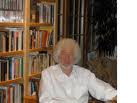 In this series of interviews, called Publishing Talks, I have been talking to book industry professionals about the future of publishing, books, and culture. This is a period of disruption and change for all media businesses. How will publishing evolve as our culture is affected by technology, climate change, population density, and the ebb and flow of civilization and its economics? Publishing Talks interviews help us understand the outlines of what is happening, and how we might ourselves interact with and influence the future of publishing as it unfolds.
In this series of interviews, called Publishing Talks, I have been talking to book industry professionals about the future of publishing, books, and culture. This is a period of disruption and change for all media businesses. How will publishing evolve as our culture is affected by technology, climate change, population density, and the ebb and flow of civilization and its economics? Publishing Talks interviews help us understand the outlines of what is happening, and how we might ourselves interact with and influence the future of publishing as it unfolds.
These interviews give people in the book business a chance to talk openly about ideas and concerns that are often only talked about “around the water cooler,” at industry conventions and events, and in emails between friends and they give people inside and outside the book industry a chance to hear first hand some of the most interesting and challenging thoughts, ideas and concepts being discussed by people in the book business.
In May, 2010, Dan Halpern was honored by the Poetry Society of America along with the Academy of American Poets and NYU’s Creative Writing Program on the occasion of the fortieth anniversary of the Ecco Press (the publishing imprint of which he is the founder). Aside from being well-known as a successful publisher of quality literature, Dan is himself a poet, writer and editor of a number of important anthologies. Along with his mentor, Paul Bowles, he founded the literary magazine Antaeus (out of which Ecco originally was born). He is currently the editorial director of Ecco Press, which is now an imprint of HarperCollins. He has received many grants and awards, including fellowships from the Guggenheim Foundation and the National Endowment for the Arts.
While I do not know Dan well, we have some friends in common and shared experiences as editors of literary magazines and a deep interest in poetry. I wanted to talk to him for the Publishing Talks series, as he has been able to maintain his deep commitment to publishing important literary work, continuing to write and edit himself, within a commercial context during a period of massive change in the publishing business. I think his perspective on books and writing, past, present, and future, is a valuable one, and instructive for many of us in the book business whose expectations are being severely challenged by the state of the current book marketplace. Dan’s commitment and dedication to writing, ideas, art and culture inform his outlook on the past, present and future of publishing and books.
Podcast: Play in new window | Download
Tatjana Soli: The Lotus Eaters: A Novel
June 4, 2010 by David
Filed under Fiction, WritersCast
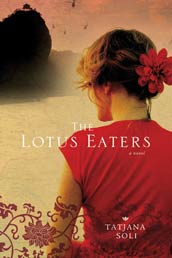 978-0312611576 – St. Martin’s Press – Hardcover – $24.99 (also available as an e-book)
978-0312611576 – St. Martin’s Press – Hardcover – $24.99 (also available as an e-book)
I know I am not alone having read both Tatjana Soli’s The Lotus Eaters and Karl Marlantes’ Matterhorn – they are unavoidably linked as both are set in Vietnam during the American war. Of course they are incredibly different in outlook, approach and story, but reading them together is a wonderful experience. As Writerscast listeners know, I loved Matterhorn – I do think it is the great novel of the Vietnam War that we have been waiting to experience for several decades.
At the same time, Tatjana’s novel is simply remarkable. She writes beautifully, inhabits her characters, their place and time, their suffering, challenges and transcendent moments. As she told me in her interview, she fell in love with the Vietnam of that era from afar, and learned everything she could about it in order to be able to write this story. Her main character is a young photographer, Helen, who comes to Vietnam early in the war, mainly because her brother died there, and she is drawn to the place where he lost his life, to figuratively solve the mystery of his death. But that is just the beginning of her journey. The war, the soldiers and other journalists, and the people of Vietnam overtake her. She becomes deeply connected to this place and time. Soli brilliantly portrays the landscape and the people of Vietnam, the suffering and horror of a seemingly endless war, and the way that war overtakes every element of human and natural life.
Helen falls in love with another photographer, Sam Darrow, a grizzled veteran who teaches her how to cope with war, survive, thrive, document, participate, suffer and love the danger and energy of men at war. But the truest, and deepest story is her love for Linh, an exceptionally complicated Vietnamese former soldier, who has gone to work for the American news agency Helen works for. At the end of the book, which thankfully avoids the cliched approach of much modern fiction, Helen and Linh journey out of Vietnam through Cambodia, an even more horrendous landscape of death and together find their way to safety, a harrowing journey that mirrors where they have traveled emotionally through the course of the novel.
A woman among men sees war more clearly than most, I think; in this book, that vision focuses and transforms the reader as well. Tatjana Soli’s story about writing this book and what it means to her is great to hear. I think she is a terrific writer, worth reading, and well worth listening to as well.
Podcast: Play in new window | Download
Publishing Talks: David Wilk interviews Jason Allen Ashlock
May 31, 2010 by David
Filed under PublishingTalks, The Future
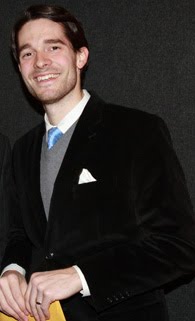 In this series of interviews, called Publishing Talks, I have been talking to book industry professionals about the future of publishing, books, and culture. This is a period of disruption and change for all media businesses. How will publishing evolve as our culture is affected by technology, climate change, population density, and the ebb and flow of civilization and its economics? Publishing Talks interviews help us understand the outlines of what is happening, and how we might ourselves interact with and influence the future of publishing as it unfolds.
In this series of interviews, called Publishing Talks, I have been talking to book industry professionals about the future of publishing, books, and culture. This is a period of disruption and change for all media businesses. How will publishing evolve as our culture is affected by technology, climate change, population density, and the ebb and flow of civilization and its economics? Publishing Talks interviews help us understand the outlines of what is happening, and how we might ourselves interact with and influence the future of publishing as it unfolds.
These interviews give people in the book business a chance to talk openly about ideas and concerns that are often only talked about “around the water cooler,” at industry conventions and events, and in emails between friends and they give people inside and outside the book industry a chance to hear first hand some of the most interesting and challenging thoughts, ideas and concepts being discussed by people in the book business.
I first read about the new literary agency, Movable Type Literary Group established by Jason Ashlock and his partner Meredith Dawson a few months ago. I’ve wondered for awhile now about the role of agents in the changing landscape of book publishing, and evidently so have Jason and Meredith. Along with an NEA based graph on their home page “Books are not dead,” they have composed the following statement of purpose and occasion:
“We have arrived, as Harold Bloom might say, belatedly.
The scene is established, the paradigms rigid, the machine stubborn and aging. Now more than half a millennium removed from the prima typographicae incunabula, “the first infancy of printing,” a chorus now announces the swift and coming death of the published word and the end of book history. But crisis and opportunity are concurrent, and the instability of one paradigm leads to the creation of another. We work in publishing at a moment of both belatedness and birth, when the trend of all future events is being determined. We aim, with many of our friends and colleagues, to confront the crisis of the moment and from the upheaval to design and shape a future.”
When I ran across Jason at a publishing event in Manhattan, we arranged to talk. I wanted to hear in his own words what this new agency will be all about. I think alot of what he says here will resonate for listeners of this podcast. Certainly, it makes sense for the role of the agent to be transformed, and to help lead the transformation of relationships between author, publisher and audience that is emerging now. It looks like Movable Type has an opportunity to create a new model for its own clients, and by example, for others as well. Maybe because, like many others looking at an established industry with new eyes, Jason Ashlock has an opportunity to create a new paradigm.
Podcast: Play in new window | Download
Alice Lichtenstein: Lost: A Novel
May 24, 2010 by David
Filed under Fiction, WritersCast
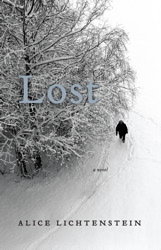 978-1439159828 – Scribner – Hardcover – $24.00 (also available as an e-book)
978-1439159828 – Scribner – Hardcover – $24.00 (also available as an e-book)
Some books are painful but must be read; the suffering of the characters we identify , endured, the story absorbed into one’s bones. I found that to be the case with Lost: A Novel by Alice Lichtenstein. This story operates on a number of levels, as a good novel should. Its three main characters are “lost” but each in different ways. And unlike the television show of the same name (I wonder how that congruency affects the potential readership of this novel?), the core of the story is not hidden away from us, the literal losses in this novel are by far not the deepest pain the characters endure, nor we the readers with them.
But don’t get wrong, this is not a novel so full of pain that it drives you away, or causes you to wonder why you are there. It’s not a book that is simply devoted to misery, and certainly not the kind of suffering that drives us away from the book or its characters. I was immediately drawn into the story, attracted to the characters, especially Susan, whose husband suffers from acute dementia, and has walked away into the winter, and Christopher, whose wife has left him. Their losses and their relationship is at the heart of the novel, and will ultimately unite them in redemption. I really liked the carefully woven web which connects the three key characters and the various subplots that eventually lead into the fullness of the novel.
And this is definitely a novel of winter in a cold country, which ironically provides much of the heat of the story. The coldness in the book is palpable – the author does live in and deeply feels the north country; she describes the cold like a native.
As much as I enjoyed the novel, I also very much enjoyed talking to the author, Alice Lichtenstein. In our conversation, we explored the complexity of the novel and her characters’ desires, their connections and the meaning of their losses. This is a book I recommend to friends, and an author whom I think has alot to say about human life and emotion, and importantly, who writes really well. Plus she is a good conversationalist. It’s not that easy a combination to find. 
Podcast: Play in new window | Download
Aharon Appelfeld: Blooms of Darkness
May 15, 2010 by David
Filed under Fiction, WritersCast
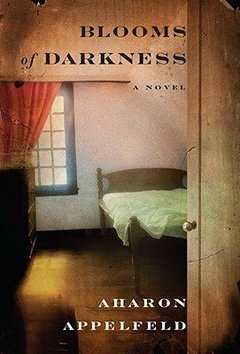 978-0805242805 – Shocken Books – Hardcover – $25.95
978-0805242805 – Shocken Books – Hardcover – $25.95
Aharon Appelfeld’s Blooms of Darkness is a powerful, majestic and triumphant coming of age novel. It’s told entirely in the first person, in sentences that are short, sharp, clear and beautifully composed. And since we know that it was written originally in Hebrew, the translator, Jeffrey M. Green, deserves special mention for the excellent English version we have here.
The book takes place in an unnamed city in Ukraine from 1943 to the end of the war, not even three years. The narrator and central character is Hugo, 11 years old at the outset of the novel, taken by his mother to stay with her closest friend Mariana, who turns out to be a prostitute living in a brothel. Much of the novel, therefore, takes place in the closet and room they share, under constant threat of exposure and death. The sense of living in a highly charged atmosphere, in such an internal space, is almost palpably claustrophobic, and inhabits every element of the story. The relationship between Hugo and Mariana is the core of the novel; they each suffer, they depend entirely upon each other. Their relationship grows and deepens through the course of the novel and its experience becomes a powerful transformative force for Hugo, who, like the author, survives the war as a completely different person than he was when his story begins.
Aharon Appelfeld has lived in Jerusalem for more than sixty years. He speaks many languages, but now writes only in Hebrew, which he learned only as an adult. We talked in depth about the events and characters in this beautiful novel, the nature of fiction as opposed to memoir, and about the author’s life as a Holocaust survivor and Jewish writer and teacher. Blooms of Darkness is a novel that has stayed with me since I read it; its story is one of hope and survival, as is the life of its author. This novel was transformative for me, as was my discussion with its brilliant author.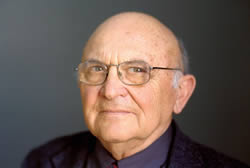
Podcast: Play in new window | Download

